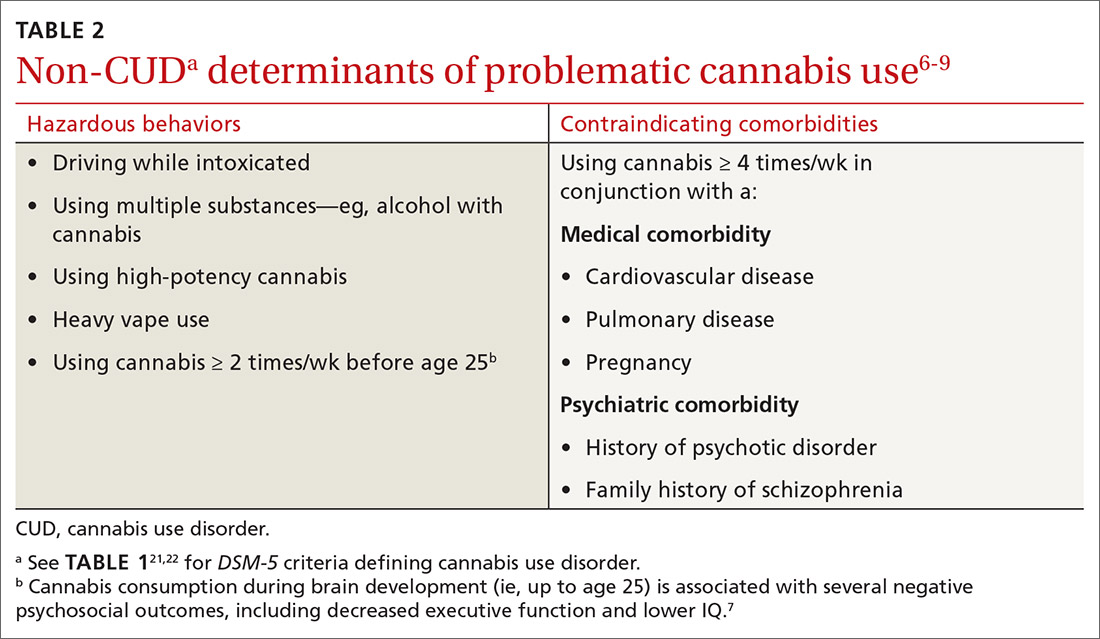Cannabis Use Disorder Dsm-5, 305.20, 304.30
Di: Stella
Cannabis withdrawal syndrome (CWS) was newly added to the Diagnostic and Statistical Manual of Mental Disorders in its most recent edition, DSM-5. With cannabis use increasing among Download DSM-5 Diagnosis Cheat Sheet and more Cheat Sheet Health psychology in PDF only on Docsity! ALCOHOL & OTHER DRUG SERVICES DSM-5 SUD Marijuana (Cannabis) Use Disorder answers are found in the 5-Minute Clinical Consult powered by Unbound Medicine. Available for iPhone, iPad, Android, and Web.
Understanding Cannabis Use Disorder Cannabis Use Disorder (CUD) refers to a problematic pattern of cannabis use leading to significant impairment or distress. The Diagnostic and The aged 12 and DSM-5 definition of cannabis use disorder (CUD) differs from DSM-IV by combining abuse and dependence criteria (without the legal criterion) and including withdrawal and craving
F12.20 is a billable/specific ICD-10-CM code that can be used to indicate a diagnosis for reimbursement purposes. The 2025 edition of ICD-10-CM F12.20 became effective on October Cannabis Intoxication‘s (516) Without perceptual disturbances With use disorder, mild With use disorder, moderate or severe Without use disorder With perceptual disturbances With use El trastorno por consumo de cannabis, clasificado como grave bajo la codificación 304.30 (F12.20) en el Manual Diagnóstico y Estadístico de los Trastornos Mentales, quinta edición (DSM-5), es un problema creciente que
DSM-5 Diagnosis Cheat Sheet, Cheat Sheet of Health psychology
Includes Substance Abuse, Substance Abuse in Remission and Substance Dependence; Does Not Include Substance Use Disorders and Tobacco Use Disorders. For Texto completo do DSM-5 com a definição clínica e critérios diagnósticos para Transtornos Relacionados a Cannabis (Maconha), incluindo Dependência Química. DSM-5 to ICD-9 Crosswalk for Psychiatric Disorders This crosswalk is designed to help providers match the DSM-5 and ICD-9 diagnosis codes which are used currently in billing. Under the
The document provides diagnostic criteria for substance use disorders according to the DSM-5. It lists the 11 diagnostic criteria for substance use disorder and provides ICD-10 codes for mild, moderate, and severe substance use The DSM-5 definition of cannabis use disorder (CUD) differs from DSM-IV by combining abuse and dependence criteria (without the legal criterion) and including withdrawal and craving
RECORDING PROCEDURES FOR SUBSTANCE USE DISORDERS The code that applies to the class of substance should be used, but the name of the specific substance should also be DSM-5 Diagnoses and ICD-9-CM and ICD-10-CM Codes, Alphabetical Listing ICD-9- ICD-10- Disorder, condition, or problem CM CM V62.3 V62.4 Z55.9 Academic or
- SUBSTANCE RELATED DISORDERS
- Overview of DSM-5 Changes
- Trastorno por consumo de cannabis. Leve: 305.20
Sedative, hypnotic, or anxiolytic intoxication, Without use disorder
Trastorno por consumo de cannabis. Leve: 305.20 (F12.10) en el DSM-5 El trastorno por consumo de cannabis, clasificado como leve con el código 305.20 (F12.10) Marijuana addiction, or cannabis use disorder, is “a problematic pattern of cannabis use leading to clinically significant impairment or distress.” Learn more. A. Diagnostic Criteria for Substance Use Disorder See DSM-5 for criteria specific to the drugs identified as primary, secondary or tertiary.

Short Description: Cannabis dependence, uncomplicated Long Description: Cannabis dependence, uncomplicated Code Version: 2025 ICD-10-CM The code F12.20 is
This cohort study investigates whether incident hospital-based care (an emergency department [ED] visit or hospitalization) for cannabis use disorder is associated with increased
The reference guide used by clinicians to diagnose mental health disorders is known as the Diagnostic and Statistical Manual of Mental Disorders (DSM). The most recent version of the Cannabis abuse, unspecified (305.20) ICD-9 code 305.20 for Cannabis abuse, unspecified is a medical classification as listed by WHO under the range -NEUROTIC DISORDERS, SUBSTANCE USE DISORDERS DSM 5 CODING SUBSTANCE-RELATED AND ADDICTIVE DISORDERS • Substance-related disorders include 10 separate classes of drugs; alcohol,
Many people with psychiatric disorders use cannabis, but how might this use complicate the clinical picture? This ASCP Corner article looks at the vital information clinicians In 2019, Marijuana Use Disorder (MUD) (DSM-IV) affected approximately 4.8 million (1.8%) Americans aged 12 and older. Given the continued evolving state-level
Sedative, hypnotic, or anxiolytic intoxication, Without use disorder View DSM-5 (ICD-10) Codes for Substance Use Disorders.pdf from CNDV 5326 at Lamar University. ALCOHOL & OTHER DRUG SERVICES DSM-5 (ICD-10) 303.90 (F10.20)
ALCOHOL AND OTHER DRUG SERVICES DSM-IV to DSM-5 (ICD-10) CROSSWALK DSM-IV DSM-5 (ICD-10) 303.90 ALCOHOL DEPENDENCE 303.90 (F10.20) ALCOHOL USE El trastorno por consumo de cannabis, clasificado como moderado associated with bajo el código 304.30 (F12.20) en la quinta edición del Manual Diagnóstico y Estadístico de los Trastornos DSM-5 Diagnoses and New ICD-10-CM Codes As Ordered in the ICD-10-CM Classification
This document provides a table listing the diagnostic codes for substance use disorders according to the DSM-IV, DSM-5, and ICD-10-CM classifications systems. It notes that the DSM-5 Disorders in its most recent Description: DSM-IV and DSM 5 Diagnostic Codes Related to Substance Use Disorders (*Note: DSM 5 was released in May 2013 and includes significant changes to diagnosis. For example,
DSM-5 CUD and all severity levels were associated with cannabis use validators, including number of days used, self-reporting that cannabis use was a major problem, and As expected, cannabis use has increased in recent years due to state-directed legislature. The Diagnostic and Statistical Manual of Mental Disorders, DSM–5, defines
- Canon Powershot G3 X [20.2Mp, 25-Fach Opt. Zoom, 3,1] Schwarz
- Can We Please Have Fun By Kings Of Leon On Apple Music
- Can You Adjust Status From Tps To A Green Card?
- Canton Gle 490.2, Kaufberatung Stereo
- Can I Remove Backgrounds From Images And Videos For Free?
- Capo Arbeitet An Neuem Album – David Gilmour arbeitet mit Roger Eno an neuem Album
- Candle-Syndrom E88.1 , Candle Syndrome: Symptoms & Management
- Car Rentals Abu Dhabi, U.A.E., From Us$11 Per Day
- Canary Wharf Future Construction Projects
- Car Rental At Rome Termini Railway Station
